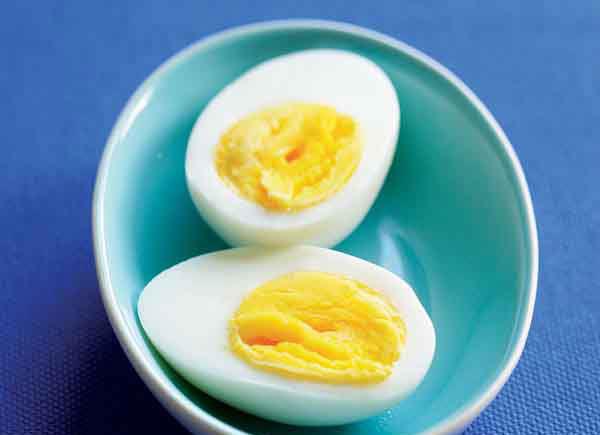Eggs are a nutritious and familiar food in the diet from the time babies start to weaning to adulthood. However, in order for babies to eat eggs properly and to make the most of the nutrients from eggs, not all mothers know.
With an abundance of protein, vitamins and minerals , eggs are listed as "universal" foods that can appear in a baby's diet from the moment of weaning to adulthood. However, did you know that of the types of eggs, which eggs have the highest nutritional content? Or how should mothers feed their babies to best absorb nutrients from eggs? Find out immediately the following information mother!
1 / For your baby to eat eggs depending on age
Eggs are a familiar and very benign food, can be suitable for babies in the weaning period, preschoolers or older children. However, depending on the age , the amount of eggs a baby can consume will be slightly different. Mother should refer to the standard dosage suitable for babies of different ages below to avoid "overdose" for babies!
- From 6-7 months: Baby can only eat egg yolks, and can not eat more than 2-3 times a week, each week should not eat more than 1/2 egg yolk.
- From 8-12 months old: Not only half, at this point the baby can already eat a whole egg yolk for each meal. Although the child has "leveled up", but also limited mother, should only eat eggs 3.4 times a week okay!
- Over 1 year old: 3-4 eggs per week is no longer a big problem for children. Of course, now even baby whites can "cup" a delicious way.

Eating more eggs is good for mom and baby? Chicken eggs also have a lot of vitamins A, D, B2, B6, B12, folic acid, choline, iron, calcium, phosphorus, potassium, fat, especially omega 3 which is essential for everyone's health, especially supplements. pregnant women, postpartum women and young children
While the egg yolk has many nutrients good for the child's brain such as choline, vitamin B12, vitamin A ..., the egg whites are also "not to be outdone" with quite high protein content and many missing yolk nutrients. such as vitamins B2, B6, B9 ... If many people consider the yolk to be food for the child's brain, the white is essential for cell growth and development of the baby's bones and teeth. Therefore, when the baby is old enough, mothers should feed the baby with both the yolks and the whites to ensure the child's comprehensive development.

Regardless of which side "bias" is more, the mother should also encourage the baby to eat enough yolks and whites!
2 / Compare the benefits between eggs
Chicken eggs: Compared with other types of eggs, chicken eggs are more familiar and popular. In addition to general nutrients, according to nutrition experts, the vitamin A content of eggs is among the highest. In particular, the egg is one of the few types of foods containing vitamin D .
Duck eggs: Contains many of the same nutrients as eggs, but duck eggs do not contain vitamin D, and are also more difficult to digest than eggs. Therefore, duck eggs are not suitable for babies to eat many times, especially at night.
- Quail eggs: Small, but no less "harmful". Not only is the nutritional content equivalent to chicken eggs and duck eggs, the phosphate fat content in quail eggs is also especially beneficial for the baby's brain development.
- Botanical eggs: On average, each 50-gram herbal egg contains about 50 mg of lead, exceeding the amount of lead a child can absorb in a day. Feeding your baby herbal eggs can lead to dangerous effects on children's health such as growth retardation, anemia, lack of concentration, and hindering metabolic processes.
- Flipped duck eggs: Although they contain many healthy nutrients such as vitamin A, protein, calcium, phosphorus ... but the nutritional content of the eggs exceeds the need of a child under 5 years old. Even if you feed your baby upside down duck eggs, they can have serious health problems.

Flipped duck eggs - A dish for children under 5 years old Flipped duck eggs contain many vitamins and minerals, which is a "golden" food every mother wants to add to the diet for her baby. However, it is not certain that your baby is old enough to try this, mom!
3 / Note when feeding your baby eggs
- With the baby's weak digestive system, mothers should not feed the baby raw eggs or eggs that have not been thoroughly cooked to avoid poisoning or digestive disorders.
- If making fried eggs for babies, mothers should use low heat. Although it takes a little more time, but this way both limits vitamin B "evaporation" and destroy all the bacteria in eggs.
- If boiling eggs, eggs should not be added while the water is still cold, but let the water boil and put the eggs in to avoid the egg cracking.
- For children over 5 years old, baby should not eat duck eggs upside down at night as well as should not eat more than 1 egg / day. In addition, should not eat duck eggs mixed with other vitamin A rich foods.
>>> See more discussions with related topics:
Nutrition for your baby
Health and nutrition for children from 1- 12 months old














